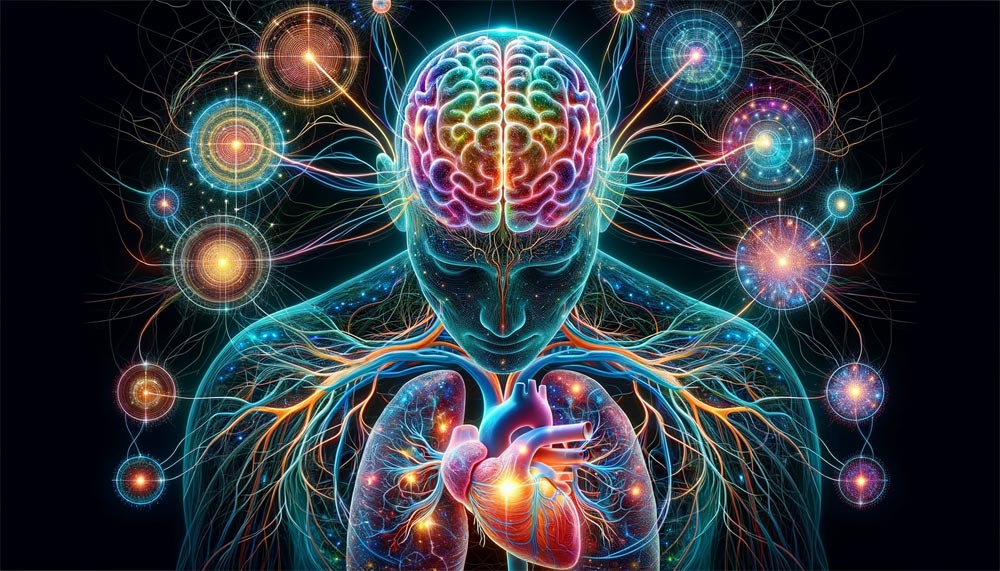
Exploring Cognitive Function Beyond the Brain
Cognition, traditionally attributed to the realm of the brain, has been a subject of fascination and study for centuries. The journey of understanding how "brain power" orchestrates the symphony of sensory information, motor commands, and higher thought processes has revealed an intricate network of cognitive functions that extend far beyond the gray matter. This comprehensive exploration delves into the "Distribution of neural resources in the human body," the nuanced "Cognitive functions in the central and peripheral nervous system," and the profound "Relationship between brain power and body organs."
Understanding Brain Power and Neural Distribution
Brain power embodies the essence of cognitive capabilities, a term used to describe the brain's ability to reason, plan, solve problems, think abstractly, comprehend complex ideas, learn quickly, and learn from experience. But how do we quantify this abstract concept?
Measuring Mental Capacity
- Cognitive Testing: Cognitive abilities are often measured through a variety of psychological tests that assess memory, problem-solving skills, and the speed of thought processing.
- Neuroimaging Techniques: Technologies like fMRI and PET scans offer insights into the active regions of the brain during cognitive tasks, thereby serving as proxies for measuring intellectual prowess.
Cognitive function, thus, is not a single faculty but a constellation of mental processes that enable humans to absorb and process information, forming the very foundation of our conscious experience.
Neural Distribution: Central vs. Peripheral
The nervous system is the command center of the body, orchestrating a range of functions. It is bifurcated into:
- Central Nervous System (CNS): Comprising the brain and spinal cord, responsible for processing information and directing action.
- Peripheral Nervous System (PNS): Extending outside the CNS, it includes nerves and ganglia, instrumental in relaying information back to the CNS and carrying out its commands.
The Widespread Map of Cognitive Functions
Delving into the intricate tapestry of how cognitive functions are scattered throughout the body, we must investigate beyond the confines of the CNS.
The Brain’s Command and Its Reach
- The Enteric Nervous System (ENS): Often dubbed the "second brain," the ENS in the gut is capable of autonomous functions and has a two-way communication with the brain.
- Neuroendocrine Coordination: The brain's interaction with the endocrine system demonstrates cognitive function's role in regulating hormones affecting mood, growth, and metabolism.
Neuroscientific Insights into Bodily Control
Groundbreaking research has illustrated the brain's central role in regulating bodily functions, with studies showing:
- Motor Skill Coordination: The cerebellum and basal ganglia’s role in refining motor movements and skills.
- Visceral Control: The hypothalamus's role in maintaining homeostasis by regulating visceral functions.
Case Studies on Cognitive Interplay
Innovative case studies have illuminated the connection between cognitive function and body organs. For instance, research on heart-brain interactions has shown how stress can impact cardiac function, indicating a tangible link between emotional cognitive processes and physical heart health.
Neuronal Plasticity: The Brain’s Adaptability
Neuronal plasticity, or neuroplasticity, signifies the brain's remarkable ability to change and adapt. It plays a crucial role in how cognitive functions are distributed and reassigned following injury or as a result of learning.
- Post-Injury Reassignment: The brain's ability to remap functions to undamaged areas post-injury.
- Learning and Memory: How the brain's plasticity underpins our capacity to acquire new skills and form memories.
Beyond the Brain: A Holistic View
Our journey into the "Distribution of cognitive functions" reveals a complex network where every organ has a role in the larger cognitive symphony.
Cognitive Function and the Heart
- The heart is not just a pump but an organ with its own "little brain" that communicates with the CNS, affecting emotional and cognitive functions.
The Gut-Brain Axis
- An emerging field of study focuses on how gut microbiota influences brain function, further solidifying the brain's interconnectedness with the body.
Implications for Health and Well-being
Understanding the distribution of cognitive capabilities throughout the body has profound implications for medical practice, mental health, and overall well-being. By embracing the notion that cognition is not solely housed in the brain but is an embodied phenomenon, we pave the way for holistic approaches to health.
Conclusion: A Symphony of Complexity
In summary, cognitive function is an orchestra conducted by the brain, but its music resonates throughout the body. With continued research in this fascinating field, we stand on the cusp of unlocking new understandings of human cognition that will revolutionize our approach to health, learning, and the human experience.
"To know the brain… is equivalent to ascertaining the material course of thought and will, to discovering the intimate history of life in its most secret operations, and to explaining the conditions of human freedom," articulated the great French physician and anatomist Paul Broca. This statement underscores our enduring quest to decode the enigma of cognitive distribution, a journey as profound as it is intricate.
Through the lens of neuroscientific discovery, each study and experiment adds a note to the grand opus of our understanding. As we advance, it is the marriage of cross-disciplinary knowledge and relentless inquiry that will illuminate the path forward. For professionals and laypeople alike, this exploration is not merely academic but touches the core of what it means to be human.
Mental Health




